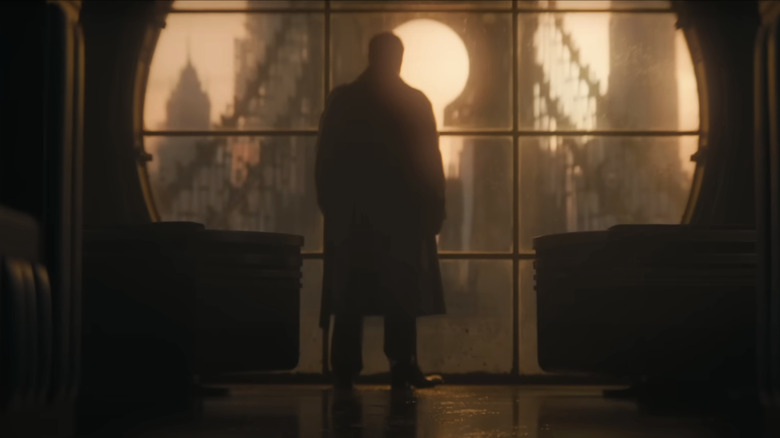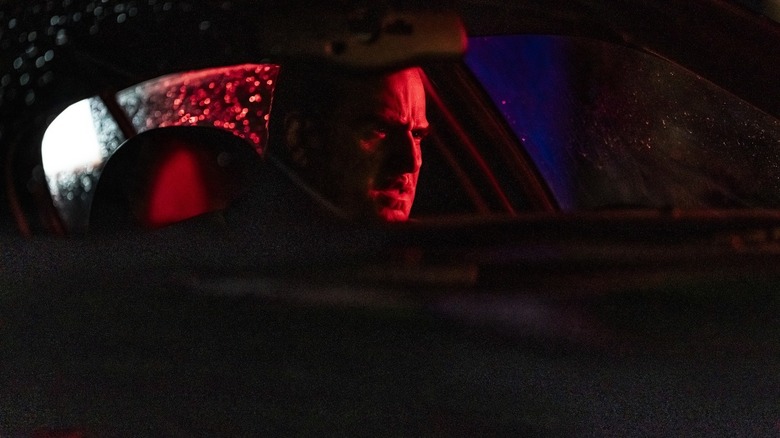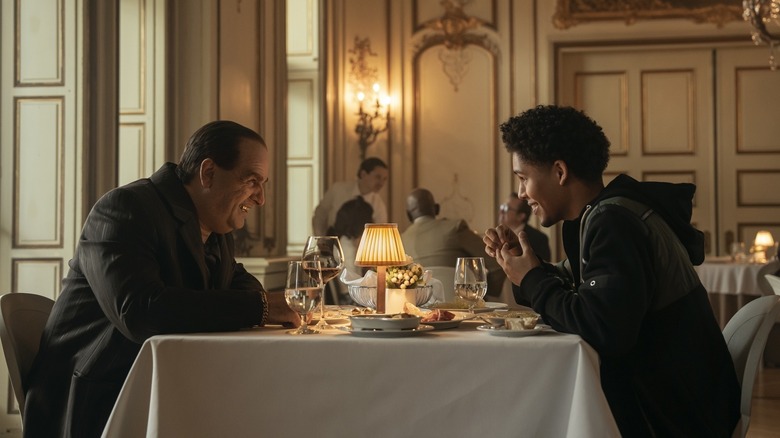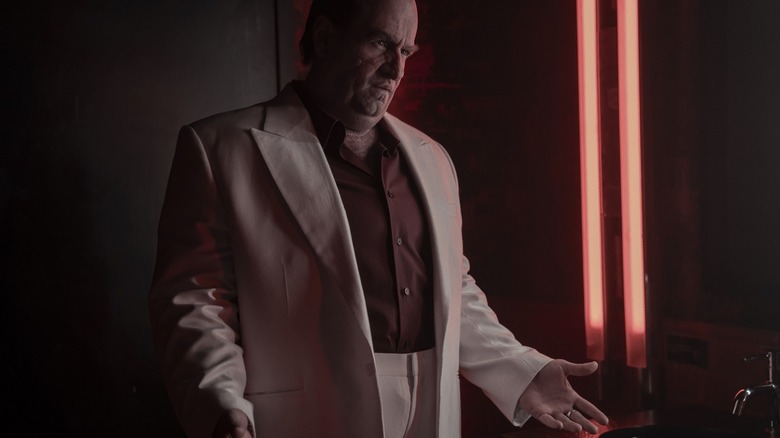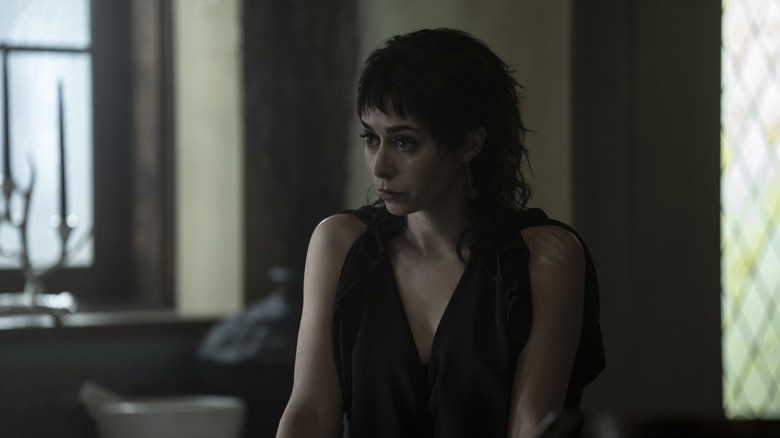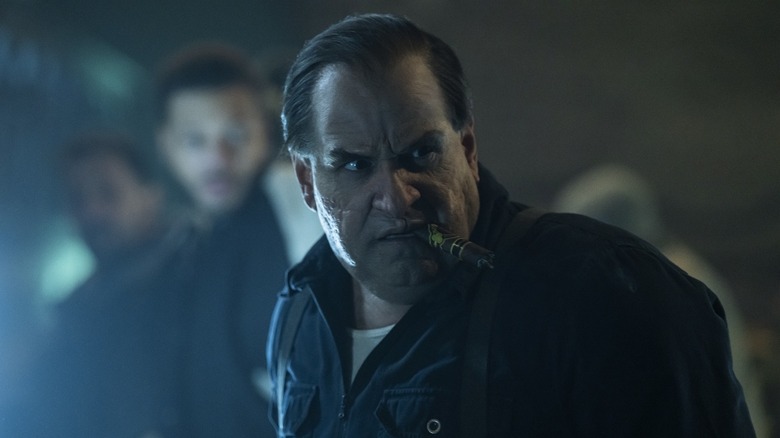We may receive a commission on purchases made from links.
Major spoilers for “The Penguin” follow.
“The Penguin” is an eight-episode character study of the titular Batman rogue. But this particular exploration of the legendary villain tries hard to get you to root for Oz Cobb (Colin Farrell), before ultimately rebuking us all for doing so. In his book, “The Gift of Fear: Survival Signs that Protect us from Violence,” security specialist Gavin De Becker writes:
“Charm is another overrated ability. Note that I called it an ability, not an inherent feature of one’s personality. Charm is almost always a directed instrument, which, like rapport building, has motive. To charm is to compel, to control by allure or attraction. Think of charm as a verb, not a trait.”
This brief excerpt acts as a good guide for understanding “The Penguin,” not only in the sense that it describes Oz Cobb’s most significant characteristic, but because it gets to the heart of the trick this show is pulling. From the very beginning of the series, Oz is just as charmingly sleazy as he was in Matt Reeves’ incredible superhero movie “The Batman,” projecting the same Tony Soprano meets Robert De Niro in “Goodfellas” energy as he did in the film. But the show delves deeper in an attempt to make Oz more than just a pastiche of notable figures from mob movie and TV history. “The Penguin” is mostly successful in doing so, presenting a character that is at once an endearing underdog and a ruthless megalomaniac, causing the audience to oscillate between sympathy and revulsion.
The end of “The Penguin,” however, is a stark warning against our own capacity to be charmed by figures like Oz, who on his mission to control Gotham’s criminal underworld, seems at times to represent an antihero of sorts. If there’s anything the “Penguin” finale wants us to know, though, it’s that Oz is the exact opposite of any kind of hero, and that we should all be doing a better job of remembering that charm is a verb.
The origins of Oz in The Penguin
When “The Penguin” begins, we see Oz Cobb looking out over Gotham from the late Carmine Falcone’s hideout above the Iceberg Lounge. This mob footsoldier could see his future from that vantage point, surveying a flooded Gotham and envisioning his ascent to criminal kingpin in the resulting power vacuum. As the show goes on, we learn that, far from the supervillain of the comics, this ambitious crook came from humble beginnings, growing up in a lower-middle-class neighborhood and idolizing a local gangster by the name of Rex Calabrese — a nod to a Batman villain from the comics.
Throughout “The Penguin,” we see Oz battle for criminal supremacy, but this battle isn’t won by violence alone. Oz’s ascendency is propelled by his charm. From the very beginning, we see how the man was able to talk himself into, or out of anything, not only convincing Sofia Falcone (Cristin Milioti) that someone other than himself killed her brother, Alberto (Michael Zegen), but that she should team up with him to usher in a new era of drug dependency in Gotham. Oz also manages to play the Falcone and Maroni crime families against one another, convincing each side he’s working for them, when really he’s only ever been working for himself.
But by far Oz’s greatest trick in “The Penguin” is charming the audience. Throughout the eight episodes, Colin Farrell’s villain not only charms us with his Joisy intonation and humble backstory, he speaks real truth that should resonate with anyone who cares even an iota about social issues. In episode three of “The Penguin,” for instance, not only did we get to see the human cost of The Riddler’s plan from “The Batman,” we also got to see how young Victor Aguilar (Rhenzy Feliz) is drawn into the fold of Oz’s criminal enterprise — and how he ultimately serves as a stark warning about the dangers of letting a charmer such as Oz get into your head.
What happens in The Penguin finale?
The eighth and final episode of “The Penguin” begins with a flashback, in which Francis Cobb (Deirdre O’Connell) talks to local gangster Rex Calabrese about how she knows her son, Oz, trapped his two brothers underground to drown. She plans to have Rex kill her son, but ultimately decides against it after he implores her not to give up on him.
In the present day, Oz and Francis are held captive by Sofia Falcone (Cristin Milioti), who prods Oz to finally admit the truth about his brothers’ deaths. But even when his mother’s safety is threatened, he can’t be honest, in what is one of the episode’s first reminders of just how twisted Oz really is. His mother becomes enraged and assaults her son, yelling, “I wake up every day sick that I’m your mother. You’re the devil. You’re the goddamn devil.” Of course, thus far the show has simultaneously humanized Oz and revealed him to be a ruthless criminal, but the cries of his mother here foreshadow the absolute moral abomination to come — one which removes all doubt about Oz’s true nature.
After Francis experiences what is later revealed to be a stroke, Oz pulls a John Wick, single-handedly taking out Sofia’s henchmen and fleeing. He heads to the Gotham courthouse where he meets councilman Sebastian Hady — the same councilman who turned the power back on in Crown Point. At their meeting, Oz spins the councilman a story about how Sofia has been behind all the mayhem in Gotham of late, promising to deliver the daughter of Carmine Falcone to Hady to help further his political career. Hady, who in the comics is actually Gotham’s corrupt mayor, accepts Oz’s offer in exchange for allowing the enterprising criminal access to the city’s upper echelons of power.
This alliance between the two suggests we’ll be seeing more of Hady in the future, perhaps as a character in “The Batman: Part 2” who challenges upstanding mayor Bella Reál (Jayme Lawson) for control of Gotham.
The Penguin finale makes clear who Oz Cobb really is
In the finale, by the time Oz is captured and brought to Sofia, he’s convinced pretty much all of Gotham’s underworld to follow his lead in exchange for a bigger slice of the organized crime pie, making Penguin the new criminal king of Gotham. He takes Sofia captive and drives her to a remote location on the city’s waterfront. Instead of killing her, though, Oz leaves Sofia alive so the police can take her into custody and his new pal councilman Hady can claim the credit for cleaning up Gotham’s streets by capturing the head of the Falcone crime family.
Before Gotham’s finest arrive, Sofia tells Oz that she knows who he really is. “You were right,” she says. “I didn’t see you. But she did. She knew from the very beginning. You have always been a monster.” She is, of course, referring to Francis, who knew her son was “the devil” when he was just a child. At this point, Oz has committed so many heinous acts, the audience should be rooting against him. But even after all the murder and deceit, there’s still a shred of sympathy for the ambitious underdog at play. It’s after this, however, that the episode delivers the real coup de grâce.
With his mother in a vegetative state, Oz sits alongside Vic by the Gotham waterfront. There, Vic tells his mentor, “You’re like family to me,” before Oz commits his most brutal, indefensible act yet. He brings Vic close, telling him “I can’t bring you with me this time,” before strangling the youngster to death. “That’s the thing about family,” Oz says as Vic struggles. “It’s a strength. It drives you. But f**k if it don’t make you weak too. I can’t have that no more.” The murder of Vic is the moment where even the most forgiving of viewers should finally see Oz for the devil he really is.
Victor is the key to The Penguin
Just a good kid from humble beginnings, Victor’s tragic backstory is shown in detail during a flashback in episode three, in which his family is killed as a result of Riddler’s flooding of Gotham. Prior to that, Victor had been encouraging his father to be more ambitious and live the life he deserves. Victor’s dad, however, remains humble, and encourages his son to follow suit.
As episode three progresses we see Oz engage in one of his protracted sweet-talking efforts as he and Victor dine at a fancy restaurant. Speaking to Victor about his mechanic father, Oz says, “The world ain’t set up for the honest man to succeed. Mechanic’s a good job. That should be the American dream right there. Y’know, a beautiful story with a happy ending. But that ain’t the way the world works, Vic. America’s a hustle.” Here, Penguin is using elements of the truth to charm Vic. He’s not only telling him what he thinks he wants to hear, he’s picking up on the very real injustice of inequality and using it to get inside Vic — and by extension the audience’s — head. What’s more, Oz chastises a waiter for finishing Vic’s sentence after the teen struggles with his speech impediment, telling him, “Hey, don’t do that. The man was speaking.” It’s one of many moments that seemingly demonstrates Oz’s investment in being a genuine mentor for his young protégé, helping to slowly convince us he’s capable of selflessness when it comes to those in whom he sees himself. “You got fight in ya, Vic,” he says. “You gotta let it out.”
Later in the episode, Oz expands on what is essentially his guiding philosophy. Cornering Vic in a club bathroom he says:
“You wanna know what’s shameful, Vic? Working your whole goddam life, having nothing to show for it. You still think there’s good and bad, right and wrong? There ain’t. There’s just this. Survival, security, pleasure. They don’t give out awards for dying in the projects.”
There couldn’t be a better distillation of Penguin’s moral relativism than this, and yet both Vic and us as the audience find enough truth in Oz’s rhetoric that we aren’t fully repulsed by it. Oz is right. Vic’s dad should have had more. Morality isn’t always black and white, and America is a hustle. But what’s so devastatingly effective about “The Penguin” is the way in which the finale unveils the true vacuity of this kind of talk, and the true monster that lurked beneath it all along.
The Penguin finale is a repudiation of the villain as anti-hero
Aside from the obvious “Godfather” references, “The Penguin” has drawn many comparisons to “The Sopranos.” Colin Farrell’s ungainly mobster is clearly partly inspired by the late James Gandolfini’s Tony Soprano, and the show’s chronicling of Oz’s rise through the criminal underworld is reminiscent of its fellow HBO predecessor. More crucially, though, Oz has Tony Soprano’s charisma, which means that as “The Penguin” plays out, we find ourselves identifying with the character in much the same way as Tony Soprano came to represent a kind of beloved anti-hero, and in a larger sense, the way in which organized crime has been lionized in film history.
Even when Oz commits truly heinous acts, such as burning the wife and son of Sal Maroni (Clancy Brown) alive, we don’t fully recoil. Firstly, by that point the show has painted a detailed enough portrait of Oz that we feel we understand him, even while his actions are horrific. But secondly, Sal and his family are also criminals. When Oz commits these atrocities, it’s against other people just as corrupt and selfish as him. Granted, once we find out that Oz drowned his own brothers in an underground drainage chamber, he starts to seem more and more like the true monster he is. But even then there’s an implication that the brothers were neglectful of their younger sibling. It’s at this point that we really start to question who the real Oz might be. As Francis Cobb (Deirdre O’Connell) puts it to Rex Calabrese after she finds out that Oz killed his brothers, “I got the devil in my house,” but somehow we still can’t quite fully see it for ourselves. He’s a self-interested criminal with poor morals who’s done some truly awful things. But none of it up until this point was any worse than, say, the violence perpetrated by Joe Pesci’s vicious mobsters in “Goodfellas” and “Casino.”
There’s something so unbelievably wicked about Oz’s killing of Vic, however, that the veneer of charm and likeability immediately vanishes. Vic is not a rival criminal. He is not a morally bankrupt member of Gotham’s underworld in any way. He’s a good kid who suffered a horrible tragedy that led him to a life of petty crime, before being led astray by the very man that would wind up killing him. In this moment, it’s as if showrunner Lauren LeFranc is slapping us out of our Oz-induced haze, showing us the unadulterated evil at the heart of the character and acting as a direct repudiation of the man’s contention that there ain’t “good and bad, right and wrong.” Some things, it seems, are indeed black and white, and the whole time Oz has been spouting his moral relativism, he’s been a walking advertisement of the existence of plain evil in black and white.
The Penguin sets up The Batman: Part 2
Before “The Penguin” wraps up, we see Sofia in Arkham Asylum, where doctor Julian Rush (Theo Rossi) delivers her a letter from her half-sister Selina Kyle. In “The Batman” we saw Zoe Kravitz’s Selina learn that she was the illegitimate daughter of Carmine Falcone, who she planned to kill. In “The Penguin,” Sofia learns the awful truth about her father being a serial murderer of women, including her own mother. With the two women now in contact, and with a shared hatred for their criminal father and his empire, there will no doubt be some sort of future team-up, potentially in Matt Reeves’ next film.
The episode ends with Oz stepping out of a plum Rolls Royce — a significant upgrade from his plum Maserati that was totaled earlier in the season. This signifies his ascendence to the top of organized crime in Gotham. Oz, now in the full comic book Penguin getup complete with bow tie and top hat, arrives at his penthouse home where his mother lays motionless in front of a window overlooking the city — much like Oz did at the beginning of the series. A single tear runs down the side of Francis’ face, signifying an internal reckoning with her choice to keep Oz alive and the tragic result of her actions.
In the main room of Oz’s penthouse, Eve (Carmen Ejogo) awaits. She and Oz dance together, with Eve telling her partner “Gotham’s yours sweetheart, nothing’s standing in your way now.” The camera then pulls back from the penthouse window to reveal the Bat signal in the sky over Gotham, answering Eve’s assertion with a clear reminder that Robert Pattinson’s Batman — who otherwise doesn’t appear in “The Penguin” — very much stands in Oz’s way, thereby setting things up perfectly for “The Batman: Part 2.”
The bigger message at the core of The Penguin
From the very beginning, “The Penguin” dares you to empathize with its protagonist — to see charm as a noun and not a verb — even as it depicts his megalomania, self interest, and psychopathy at every turn. Lauren LeFranc’s character study is an unvarnished look at Oz Cobb, but even LeFranc can’t stop the character himself from charming us all and feigning depth of feeling. By the end of “The Penguin,” however, LeFranc and her writers issue an emphatic indictment of their protagonist, forcing every one of us who dared to root for Farrell’s underdog to reckon with our own capacity for overlooking wrongdoing in the face of potent charm.
But Vic’s murder serves as more than a confirmation of the Penguin being flat out evil. Given the series’ obvious influences and its place in the lineage of mob movies and TV shows, this moment serves as a larger repudiation of the idea of the mobster as an antihero. In fact, there’s something even more profoundly wide-ranging at play here. In our current moment, serial killers are being given the prestige drama treatment, with shows such as “Monster: The Jeffrey Dahmer Story” and its follow-up “Monsters: The Lyle and Erik Menendez Story” provoking controversy for their apparent glorification of killers. More generally, true crime is as popular as ever, and our collective fascination with serial killers poses real ethical issues. If you think “The Penguin” is unconcerned with any of that, there’s a reason why when Doctor Julian Rush delivers the letters to Sofia, he says “Mostly the usual — Rants, poems, marriage proposals.” The show is keenly aware of our capacity to venerate truly terrible people.
With that in mind, one can’t help but feel as though the slow disintegration of Oz Cobb’s charming veneer, and its abrupt destruction in the season finale, are saying something about our proclivity for glorifying bad guys. In that sense, “The Penguin” feels like more than just a “character study.” It feels like more than just a superhero spin-off with ambitions to be taken seriously as a crime drama. It feels like an eight-episode disavowal of the bad guy as hero trope and our fascination with immoral figures. The final episode leaves no uncertainty around who Oz Cobb is. He’s a monster, a “devil,” and the only thing worse than this realization is the realization that, for large parts of his journey, we were rooting for the devil to win.



